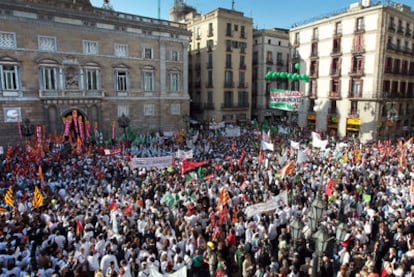Catalonia's deep health cuts raise sector's ire
Resistance growing to one-billion-euro spending reduction as part of austerity drive
The game has begun, and the playing field is Barcelona. At stake is the future of healthcare, education and social services - the pillars of the welfare state, now under fire due to the crisis. The cuts imposed by the government of Catalonia have unleashed a force that could well overtake the rest of Spain following the regional elections of May and next year's general election.
On Wednesday and Thursday, thousands of health workers from a dozen hospitals took to the streets to protest these cuts and to demand the resignation of the Catalan health commissioner, Boi Ruiz. The health workers have received support from all the unions and opposition parties.
These demonstrations, which have also taken place in other cities, such as Vic, are the answer to a
Thousands of health workers from a dozen hospitals have taken to the streets
"If they want us to make more cuts, let them come and show us how"
one-billion-euro reduction in health spending that has made headlines for weeks. Dozens of hospitals will have to reduce their services and over 5,000 health workers will lose their jobs, according to union estimates.
"If they want us to make more cuts, let them come and show us how. Let them come and do it. We can't take it anymore," says Lluís Sacrest, mayor of Olot, Girona, and head of the foundation that runs the city hospital, Sant Jaume, which has been asked to reduce its spending by more than eight percent.
The regional government has also taken a good whack at education spending. After announcing 20-33 percent reductions in utility expenses for public schools, the department of education has just said it will eliminate the sixth hour of daily classes in favor of a five-hour courseload. Unions estimate that around 3,400 jobs will be lost when substitute teachers are no longer hired.
As for social services, one of the Catalan executive's first public statements after winning regional elections last November was a reminder that it would be unable to meet the central government's demands with regard to the Dependents Law.
But the back-to-back protests have forced the ruling nationalists of CiU to react. On Tuesday, the executive council approved a surprising plan to guarantee "100 percent of primary care, emergencies and treatment for the most serious cases." The initiative is noteworthy as it guarantees the obvious while allowing cutbacks in the rest of the health system.
The administration of Artur Mas is feeling increasingly alone on these issues. On Monday, even Mas' main health advisor, Miquel Vilardell, criticized the cuts. At that point, "all the emergency lights went off" at government headquarters, a source admits. This solitude is equally noticeable in the regional parliament, where CiU is six representatives short of an absolute majority. This means it will have trouble getting the budget approved. Its initial allies, the Catalan Socialists and the Popular Party, have turned their back on a deal.
Asked by left-wing parties to curb the cuts and negotiate an alternative plan, the premier replied bitterly: "If we keep up like this, we're headed for collapse like Greece. Do you want to follow the Greek example? Do you know what that means? A collapse of public services, a collapse of the welfare state and a collapse of the modest classes."

Tu suscripción se está usando en otro dispositivo
¿Quieres añadir otro usuario a tu suscripción?
Si continúas leyendo en este dispositivo, no se podrá leer en el otro.
FlechaTu suscripción se está usando en otro dispositivo y solo puedes acceder a EL PAÍS desde un dispositivo a la vez.
Si quieres compartir tu cuenta, cambia tu suscripción a la modalidad Premium, así podrás añadir otro usuario. Cada uno accederá con su propia cuenta de email, lo que os permitirá personalizar vuestra experiencia en EL PAÍS.
¿Tienes una suscripción de empresa? Accede aquí para contratar más cuentas.
En el caso de no saber quién está usando tu cuenta, te recomendamos cambiar tu contraseña aquí.
Si decides continuar compartiendo tu cuenta, este mensaje se mostrará en tu dispositivo y en el de la otra persona que está usando tu cuenta de forma indefinida, afectando a tu experiencia de lectura. Puedes consultar aquí los términos y condiciones de la suscripción digital.








































